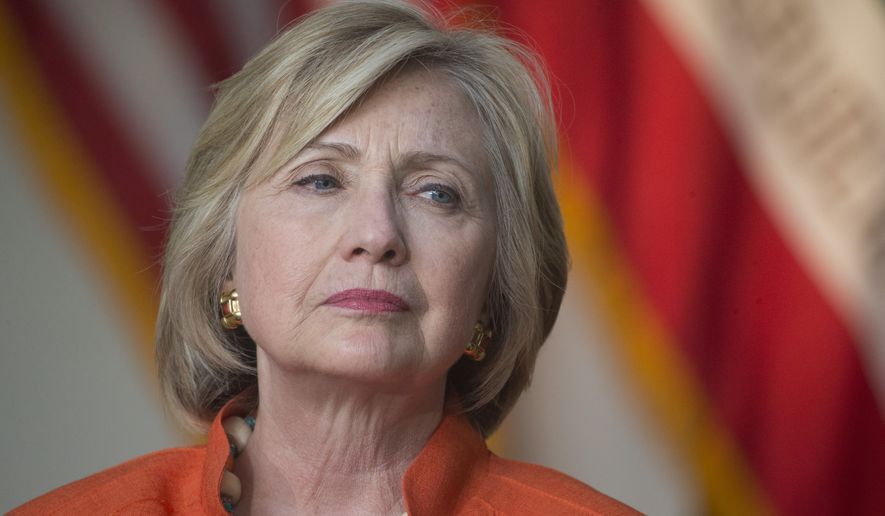The revelation that Hillary Rodham Clinton’s private emails contained sensitive information derived from spy satellites and signal intelligence undercuts her defense that she had no reason to believe she was dealing with classified information, security experts say.
“If she is so ignorant that she doesn’t recognize that this type of information in the email as being classified, it just calls into question her overall competence,” Larry Johnson, a former CIA analyst trained in the rules of handling government secrets, told The Washington Times.
As details emerge about the extent of Mrs. Clinton’s use of personal email to exclusively conduct business as secretary of state, her defense has shifted.
At first, she stated flatly that her private emails did not hold or transmit classified information. She later amended that defense to claim that none of the information she sent by private email was classified at the time she sent it.
Now, her defenders have evolved her story further, suggesting that she didn’t know information she was handling was classified because it wasn’t marked as such.
Pete Hoekstra, former chairman of the House Permanent Select Committee on Intelligence, wrote an op-ed published Wednesday in The New York Post calling the latest explanation from the Clinton camp a “sham.”
SEE ALSO: Hillary Clinton emails: State Department-intelligence community turf war looms over review
“The statement ignores how the process works. The reason government officials with security clearances are required to keep their correspondence on the appropriate government server is so the material can be vetted and classified prior to hitting ’send’ to an uncleared recipient,” Mr. Hoekstra and former federal prosecutor Victoria Toensing wrote in the joint op-ed.
In an interview with The Times, Mr. Hoekstra said that repeating in an email classified information from a report or a secure briefing still violates regulations.
He recalled the extraordinary steps the intelligence community took when it gave him top-secret information. He received the data either in a secure room in a House office, at an off-site FBI facility or on his secure phone.
Asked whether it was possible that Mrs. Clinton dealt with top-secret material but did not know it, Mr. Hoekstra answered: “Sure, it’s always possible that you will have received information from the intelligence community that they consider top secret and you may not be aware of that. Unlikely, but possible.”
Last month, the inspectors general for the State Department and the intelligence community flatly contradicted Mrs. Clinton’s claim that her emails did not contain national secrets. They wrote in a public joint statement that the information among thousands of emails on her private server was definitely classified at the time.
“These emails were not retroactively classified by the State Department,” the inspectors general wrote. “Rather, these emails contained classified information when they were generated and, according to IC classification officials, that information remains classified today. This classified information should never have been transmitted via an unclassified personal system.”
This week, I. Charles McCullough III, the intelligence community’s inspector general, revealed that not only did a small sampling of Mrs. Clinton’s 30,000 emails turned over to State contain classified information, but two held data that were top-secret — the highest classification.
Mr. McCullough went further. The top-secret information was labeled “SI,” which is intelligence community parlance for “special intelligence.” Special intelligence is intercepted communications from foreign targets.
In addition, the intercept came from code word “talent keyhole,” (TK), which stands for the nation’s military satellites and their production of classified imagery and intercepted communications.
An intelligence spokeswoman said the TK compartmental function “protects information and activities related to space-based collection of imagery, signals, measurement and signature intelligence, certain products, processing and exploitation techniques, and the design, acquisition, and operation of reconnaissance satellites.”
“TOP SECRET/SI/TK” means her server held some of the nation’s most sensitive information. The information could have come from the National Security Agency and most certainly the National Geospatial-Intelligence Agency, experts said.
Mr. Johnson, the former CIA analyst, said revelations about the highly sensitive nature of information in certain emails call into question the entirety of Mrs. Clinton’s story about the private email server she operated out of her home in Chappaqua, New York.
“She’s admitting she lacks the knowledge and intelligence to recognize classified information. That’s her defense? That she’s stupid?” he said. “I think she knew it was classified and used it. They were passing information back and forth.”
The SI and TK designations mean that if Mrs. Clinton’s server was hacked, “there is the possibility of compromising multiple intelligence sources,” Mr. Johnson said.
Because Mrs. Clinton conducted all State Department business on one server at her home, it is assumed that her aides also passed classified information on unsecure systems. This is because a commercial system such as Mrs. Clinton’s cannot communicate with a secure government network set up to handle and protect secrets. Mrs. Clinton did not use a State.gov account, as is expected of all State Department employees.
Intelligence experts said Mrs. Clinton’s server, which she turned over under pressure to the Justice Department this week after having vowed never to part with it, was susceptible to hacks from adversaries such as China and Russia.
Mrs. Clinton handed over 30,000 printed emails in December after the special House committee investigating the deadly 2012 attack on a U.S. diplomatic post in Benghazi, Libya, pressed the State Department for her emails and discovered they were all on her own server.
Watchdog groups, including Judicial Watch, have filed lawsuits to obtain the emails under the Freedom of Information Act. Prodded by a federal judge, State Department foreign service officers and, more recently, outside intelligence officials, have been sifting through the material to delete government secrets.
The inspectors general estimate that hundreds of emails will be shown to contain classified information before the tedious process is complete.
• Rowan Scarborough can be reached at rscarborough@washingtontimes.com.




Please read our comment policy before commenting.